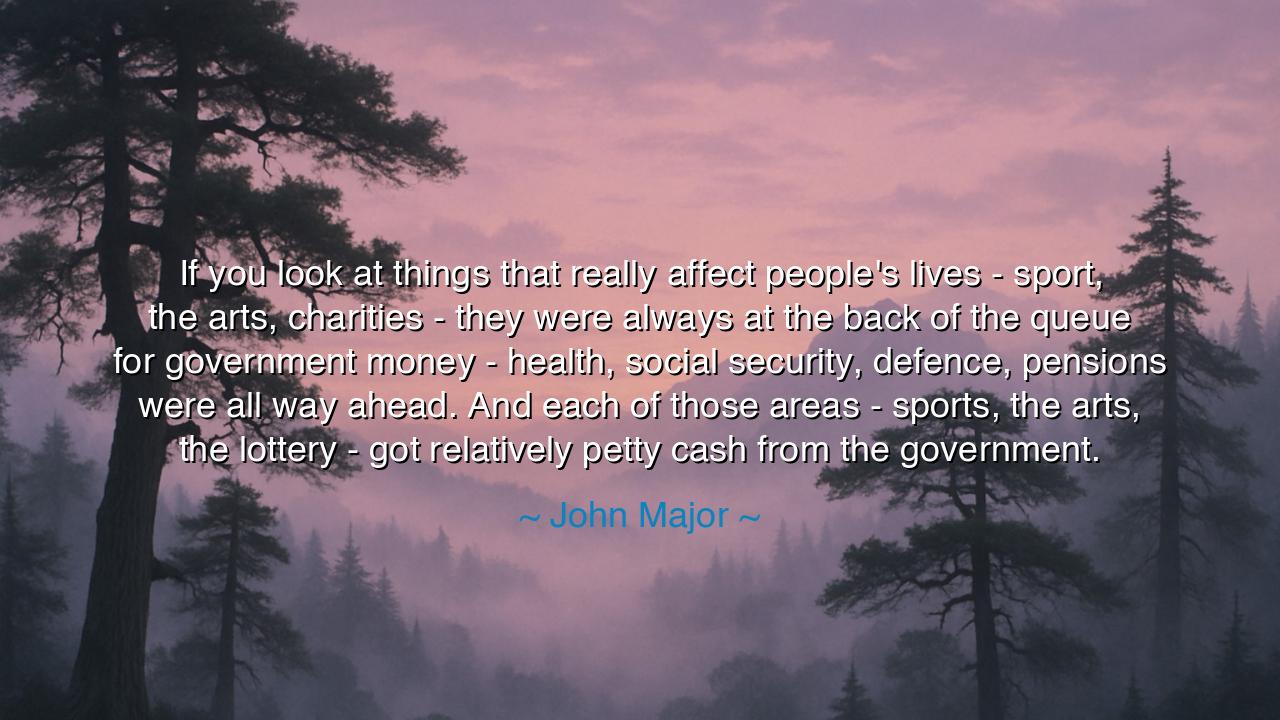
If you look at things that really affect people's lives - sport
If you look at things that really affect people's lives - sport, the arts, charities - they were always at the back of the queue for government money - health, social security, defence, pensions were all way ahead. And each of those areas - sports, the arts, the lottery - got relatively petty cash from the government.






“If you look at things that really affect people's lives—sport, the arts, charities—they were always at the back of the queue for government money—health, social security, defence, pensions were all way ahead. And each of those areas—sports, the arts, the lottery—got relatively petty cash from the government.” Thus spoke John Major, former Prime Minister of Britain, whose words reveal not only the workings of policy but the heart of civilization itself. Beneath the surface of politics lies a profound truth: that the soul of a nation is not nourished by wealth or weapons alone, but by culture, creativity, and compassion—the things that bring joy and meaning to human life. His reflection is not merely about budgets and funding, but about the hierarchy of values by which societies live or die.
In the affairs of governments, the great and urgent needs often stand first: health, for the preservation of life; defence, for the protection of sovereignty; social security and pensions, for the sustenance of the old and the vulnerable. These are noble priorities, for no civilization can endure without them. Yet Major reminds us that beyond the necessities of survival lies something deeper—the nourishment of the spirit. Sports, the arts, and charities—these are not luxuries for idle hearts, but the very instruments that give life its purpose and color. Without them, a nation may live, but it cannot truly thrive. To neglect them is to preserve the body while starving the soul.
In his time as leader, John Major sought to redress this imbalance through the creation of the National Lottery, a daring vision that would channel the desires of chance toward the service of culture and humanity. It was a modern form of alchemy—turning the coins of hope into theaters, museums, sports centers, and charitable works. For he understood what the ancients long knew: that the strength of a society lies not merely in its fortifications, but in the vibrancy of its arts, the unity of its play, and the generosity of its compassion. His words, therefore, are not a lament but a lesson—that even the smallest investment in beauty and community yields treasures beyond measure.
The story of ancient Athens offers a mirror to this truth. Though it spent heavily on wars and fortifications, what made Athens immortal was not its armies but its culture—its drama, its philosophy, its architecture, its festivals. The government of Pericles poured wealth into the arts, into temples and theaters, into the education of the mind and the refinement of the soul. For he knew that a city’s greatness is measured not by the stones of its walls but by the spirit of its people. The plays of Sophocles, the sculptures of Phidias, the dialogues of Plato—these outlasted the spears of Sparta and the gold of Persia. So too, Major’s insight calls us to remember that true legacy lies in what uplifts, not merely what protects.
Yet even now, many societies repeat the same mistake—treating the arts, sports, and charities as ornaments rather than foundations. They are first to suffer when economies falter, first to be forgotten when priorities shift. But when tragedy strikes—when war, disaster, or despair descend—it is the same neglected forces that rise to heal and inspire. The athlete teaches discipline and unity; the artist restores hope and meaning; the charity mends the wounds of the forgotten. These, too, are forms of defense—defense not of borders, but of the human heart. The health of a nation’s spirit depends on them as surely as its body depends on medicine.
Let us then heed the wisdom behind Major’s reflection: that policy must serve both necessity and nobility. To fund the hospitals is to save lives; to fund the arts is to give those lives beauty. To build armies may protect freedom; to support charities ensures that freedom is shared. Governments, and indeed all people, must learn to balance the visible and the invisible—the tangible work of survival with the intangible work of meaning. For a people that invests only in existence will lose the will to exist.
So, my child, remember this lesson as you walk through the halls of your own society: cherish not only what keeps you alive, but what makes life worth living. Support the artists who stir your soul, the athletes who lift your spirit, the charities that heal your world. Advocate for them, protect them, and never let them be “at the back of the queue.” For they are the breath of civilization—the torch that lights the darkness when all else fades. And though governments may count their worth in numbers, history counts it in beauty, kindness, and the joy of the human heart.






AAdministratorAdministrator
Welcome, honored guests. Please leave a comment, we will respond soon